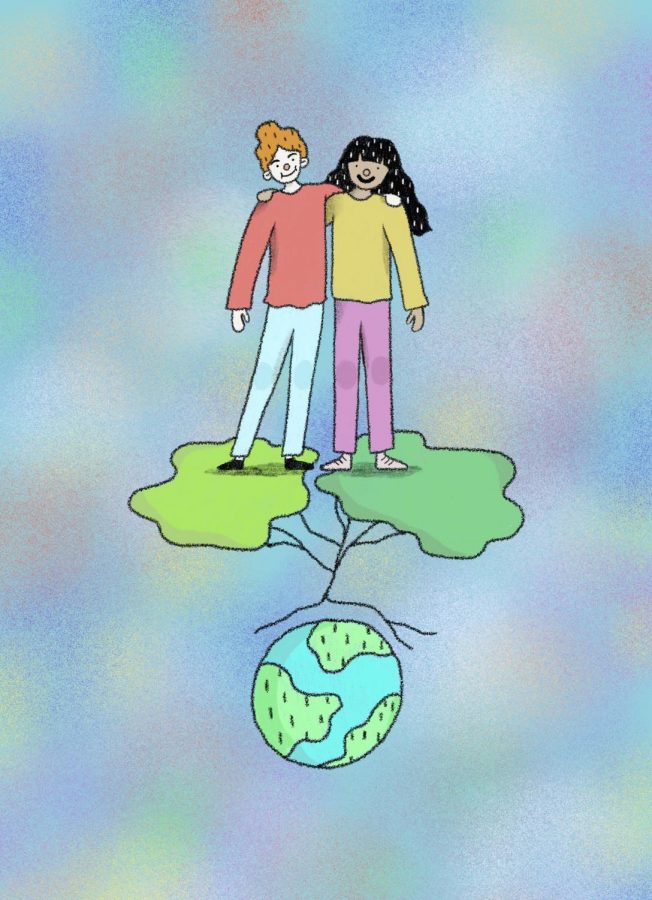Questioning your ethics makes them stronger
Caring about others is an essential aspect of humanity.
May 28, 2020
As I reflect on my time spent writing for the Tribune, I realize how much I’ve enjoyed provoking conversations on campus and pushing myself to write strong opinions that didn’t preach to the choir. In writing opinion pieces, ranging from supporting the criticism of problematic figures after their deaths to the ineffectiveness of numerous modern social movements, I have had to research many topics and examine chains of logical reasoning. If there’s one lesson I’ve learned over these past four years, it’s that you should question both the world around you and your closely held beliefs constantly in order to find the correct perspectives on issues.
For example, a week before I ended my consumption of meat in October 2018, I, out of the blue, began to wonder why I ate it. There wasn’t really a reason for the questioning as much as I was just curious and I’d honestly never considered it before. After further research, I learned about the horrors that occur in factory farms and the abuses animals face every day in the process of meat production. This type of research into other issues later led me to change my consumptive habits in other areas, including chocolate and fast fashion.
All of our moral compasses are determined, at least in part, by the information we know about the world. Considering that we definitely don’t know everything and that some pieces of information are intentionally hid from us, we should be actively researching and updating ourselves with information on what lies behind the things we consume, the effects our current actions have, and more.
I’m not saying that you should become a conspiracy theorist and start being skeptical of science. It’s the opposite. We should question the different things we think to be true and trust in well-documented and credible evidence. While most of the time, we’ll likely come to the conclusion that we are right (climate change is real), there will inevitably be some things that we are wrong about. It’s also in the interests of producers and the current economic system that you don’t know the true cost of what you purchase. Otherwise, it makes their products less appealing, which equates to decreased profits, e.g. Nike would sell less shoes if it publicly advertised its sweatshops. Thus, only actively seeking out such information will ensure you’re properly educated on the effects of your daily behaviors.
This process of testing one’s worldviews becomes easier and more natural with time, but it’s important that it not only occurs externally, but also internally. For example, I not only had to research animal abuse in factory farms, but I also had to challenge the previous logical assumptions that had led me to conclude that human superiority was somehow correct. We should never be complacent in our own moral beliefs and should rigorously test what we believe. Just because something may feel morally intuitive doesn’t mean it is; after all, our intuitions, like most other things, are just a product of the society that we live in. And society, of course, is usually immoral in many different ways.
Moral progress itself is founded on the principle of reason. A large part of why society has changed is because individuals questioned the world around them and their own ethical beliefs. If no one dared to challenge the status quo, we’d still be living with the same value systems as 100 or 200 years ago. Slavery in America was seen as just until people began to not only grow more aware of the plight of slaves, but also as they challenged the notion of white supremacy to some degree. While at the time, many believed such an atrocity was justifiable, those that challenged it are now seen as being on the right side of history, and such sentiments will be reflected in regards to various issues with our current society in years to come.
Now obviously, questioning isn’t the end — in fact, it’s pretty much useless unless it’s accompanied by action based on whatever’s been learned. It’s definitely hard, especially considering that the realizations you’ll come to will almost certainly include that fact that not only are you taking part in some unethical action, but that it actually benefits you in some capacity.
From personal experience, I’ve had the conversation about why the consumption of meat is unethical with about 30 different people. After some amount of discussion, nearly all I spoke with agreed that eating meat is wrong, but very few have actually changed their dietary habits based on the ethical conclusions they’ve arrived at.
It’s surprising, because none of these people are uncaring or soulless and they do care about doing the right thing. Most, if not all of these individuals, are passionate about some social cause and do what they can to support the movement that backs said cause. But when you only care about ‘x’ type of violence and not others because the former is more proximate to you in some capacity, what you end up implying is “oppression only matters when it affects me or those around me, but I welcome oppression when it benefits me.”
Maybe you’re thinking “But I support Black Lives Matter and I’m not black” or “I support the Women’s March and stand against sexism, but I don’t identify as female,” and that’s great. You should keep doing that, but when you’re still only taking a stance against proximate forms of violence that you can identify with (perhaps geographically because both of the former movements are happening in the United States, you know an individual that is in one of the identity groups above, etc.), you’re still saying that not all violence deserves to be examined and addressed.
More importantly, there’s an active social cost to not standing against racism or sexism or standing with the aforementioned movements. Don’t get me wrong. That’s a good thing and it should continue. The threat of social ostracization can force individuals to care about things other than themselves by imposing a cost to not doing so. The problem is, when that cost doesn’t exist, it can be extremely difficult to convince an individual to do something they won’t face any consequences for, which is a category that most of the things you find as a result of your questioning will fall into. Everyone around you likely takes part in the same unethical behaviors and you’ll receive no criticism for continuing to do what you do.
As author Hank Green analogizes: “If I want to be a racist or a homophobe or a sexist, and I’m comfortable with it because the people I hang out with have those attitudes too, well, the conversation’s sort of over.”
True empathy and care for others is committing yourself to positive change even when you don’t benefit from it, or in fact may be disadvantaged by it in some capacity, solely because it’s the right thing to do. Whether that means not eating meat, even though it tastes good, or refusing to eat chocolate due to the slave labor associated with it, despite chocolate being your favorite dessert, each of these individual actions can make the world a better place. It’s hard and perhaps to some degree, impossible, to observe the effects of our actions because the negative impacts are so far removed from our daily lives by design, but they do make a difference. To apply a concept of Australian moral philosopher Peter Singer: Not eating one chocolate bar likely won’t do much, but continuing to not eat chocolate (except perhaps from brands that truly support good working conditions for laborers) throughout your life will eventually make a difference, because there has to be some cutoff point where a store might say, “We should order more from this more ethical brand instead,” which even if by itself doesn’t change labor standards in the chocolate industry, still provides some cocoa farmers with high enough wages to survive. And that’s even empirically proven by brands like Tony’s Chocolonely that pay premiums to cocoa farmers, now making up double their market share from four years ago in some countries.
Admittedly, there are a lot of things to care about and ethical consumption under capitalism is for the most part, impossible. Every step of the production process for any item is probably tainted by some form of suffering, but we shouldn’t take that as an excuse for inaction. Inevitable unethical consumption doesn’t mean we can’t minimize that consumption when possible; in fact, small scale actions can lead to changing those broad overarching structures that allow exploitation to occur in the first place And as cliché as it sounds, the world never would have changed if any individual thought that their action was meaningless. Every milestone in the history of moral progress was achieved because an individual took the first step in demanding change.
Again, yes it’s going to be hard and I understand that, but it is possible, so don’t give up. It might require incremental changes in order to move towards ending an unethical practice entirely, but make sure to be aware when “phasing out” your unethical behavior turns into stalling.
If you remain unconvinced, you might be one of two types of people that I’ve met: one that thinks, “Look, I know I’m still wrong, but I don’t care,” or the other who thinks, “I just don’t think any of these actions are wrong because what matters is what affects me.” Both of these individuals would likely agree with claims similar to “I’m happier eating meat and I couldn’t care less about animals,” or “I’m happier participating in fast fashion; it sucks, but my happiness comes first.”
I’ve thought to the point of mental exhaustion about how to convince you if nothing I’ve said above has even put a dent in your beliefs and I’m still at a loss. It’s hard because you won’t face any consequences for your actions on these issues. You probably won’t face social ostracization because not enough people care yet about these things for such a force to be potent, because it can be ineffective due to isolating in echo chambers and because cancel culture often fails (but that’s a whole other issue).
Ultimately, our disagreement is not about the effects a policy or action would have. It is not about certain facts like empirics or whether the results of a study are statistically significant. But it is rather, to quote Emmy Award winning video editor Kayla Chadwick, “a fundamental divide on what it means to live in a society.”
I’m frustrated by your lack of empathy and your prioritization of marginal pleasure at the expense of the suffering of many. Yet, I know words likely won’t be sufficient in changing your mind.
Still, I have hope that you’ll experience something in your life that will.




